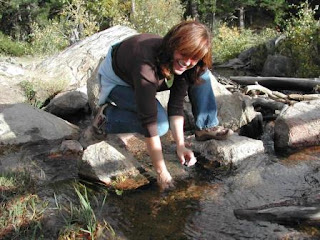HUNTINGTON, W.Va. – Dr. Tina Cartwright, an assistant professor in the College of Education and Human Services at Marshall University, will present “Launching Tomorrow’s Scientists” and share the outcomes of her work to help low-income minority children develop interest in science and find their way into science careers. The presentation will take place Thursday, March 4 on MU’s Huntington campus.
Cartwright is the featured speaker in the 2nd annual Sarah Denman Faces of Appalachia Symposium. It is scheduled from 7 to 8 p.m. in the Francis-Booth Experimental Theatre at the Joan C. Edwards Performing Arts Center. A dessert reception will follow.
In 2007, Cartwright was awarded an $800,000 grant from the National Science Foundation to begin COMETS (COMmunities Educating Tomorrow’s Scientists), an after-school science enrichment program for 8- to 11-year-olds in community centers and schools. Since 2007, 170 students in Dunbar and Charleston have participated in COMETS, some with more than 150 contact hours.
Research shows that a student’s interest in science is a better indicator for selecting a science career than grades or test scores. Yet the language of science can be inhibiting for low-income and minority students.
Cartwright studied the type of science language used by students who had high interest in science, and planned a program outside of school to provide a space where those students could develop their interest in science and their facility with science language.
Cartwright’s presentation will focus on a group of 20 students on the west side of Charleston who have consistently participated in COMETS since 2007. Her work measures students’ current interest in and use of science language, and considers as well the role of COMETS in promoting that interest in science and science language skill.
The current program will end in May, but Cartwright has recently submitted another $1.2 million grant to the National Science Foundation Science to continue the program in Kanawha County and expand it to Cabell and Wayne counties.
After Cartwright’s presentation, her project will be discussed by Steve Beckelhimer (STEM Science Coordinator for the June Harless Center), Dr. Pat Kusimo (president of the Education Alliance-Business and Community for Public Schools), and Michelle Burk (fifth-grade teacher at Dunbar Intermediate School).
The Sarah Denman Faces of Appalachia Symposium is co-sponsored by Marshall University’s Center for the Study of Ethnicity and Gender in Appalachia, National Endowment for the Humanities, Marshall University Multicultural Affairs, and the MU-ADVANCE Program.
FOR IMMEDIATE RELEASE Friday, February 19, 2010 Contact: Chris Green, Co-Director, Center for the Study of Ethnicity and Gender in Appalachia 304-696-6269
For further information, contact: Office of University Communications Marshall University | 213 Old Main | Huntington, WV 25755-1090 Fax: (304) 696-3197
















No comments:
Post a Comment